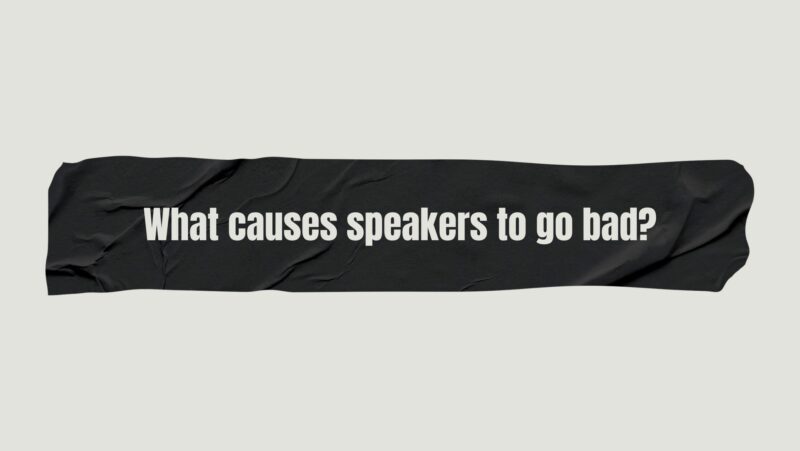Speakers, those marvels of audio technology that give life to music, movies, and immersive experiences, can lose their luster over time. The phenomenon of speakers going bad raises questions about the factors that contribute to their decline in performance. From the delicate interplay of components to the influence of environmental conditions, understanding what causes speakers to deteriorate is essential for enthusiasts and users alike. In this article, we embark on a journey to explore the intricate web of reasons that lead to the degradation of speakers, uncovering the science behind why speakers go bad.
Decoding Sound Reproduction
Before delving into the causes of speaker deterioration, it’s crucial to grasp the foundational principles of sound reproduction. Speakers, often referred to as loudspeakers, are intricate devices designed to convert electrical signals into audible sound waves. This transformation involves the coordinated movement of components such as diaphragms, voice coils, magnets, and cones. As an electrical signal passes through the voice coil within a magnetic field, the diaphragm’s motion generates sound waves that resonate through the air and reach our ears.
The Silent Culprits: What Causes Speakers to Go Bad
Understanding what causes speakers to go bad requires an exploration of multiple factors that collectively contribute to their decline:
1. Wear and Tear from Usage: One of the primary factors leading to speaker deterioration is the wear and tear incurred during usage. As speakers vibrate to produce sound, they undergo mechanical stress that affects various components, including diaphragms, voice coils, and suspension systems. Over time, this mechanical stress accumulates, resulting in microscopic wear. The precision of diaphragm movement diminishes, causing distortion, reduced sound quality, and even potential failure.
2. Material Degradation: The materials used in speaker components play a vital role in their durability and performance. However, materials can degrade over time due to environmental factors such as temperature fluctuations, humidity, exposure to sunlight, and pollutants. For example, paper diaphragms can become brittle, plastic components may warp, and adhesives can weaken. As materials degrade, they lose their ability to vibrate and resonate accurately, leading to a decline in sound quality and potential failure.
3. Oxidation and Corrosion: The presence of oxygen in the air can lead to oxidation, a chemical reaction that corrodes metallic components in speakers. This corrosion affects parts like terminals, connectors, and metal cones. Over time, oxidation weakens the electrical conductivity of these components, leading to connectivity issues and degraded performance. Corrosion can also alter the mechanical properties of components, affecting their movement and resonance.
4. Heat and Temperature Effects: Temperature has a significant impact on speaker performance and longevity. Extreme temperatures can alter the mechanical properties of materials, causing them to expand and contract. These fluctuations affect the precision of speaker components and can lead to structural damage, warping, or misalignment. High temperatures can cause adhesives to soften or break down, leading to the separation of components.
5. Electrical Overload and Power Surges: Electrical overload, often caused by excessive power input or amplifier mismatch, can stress speakers beyond their intended limits. This stress results in distortion, overheating, and potentially irreversible damage. Power surges, whether due to faulty wiring or sudden voltage spikes, can also impact speakers, causing instantaneous damage to voice coils, magnets, and electronic components.
6. Humidity and Moisture: Humidity and moisture can wreak havoc on speaker components, particularly those made of paper or cardboard. Excessive moisture can cause paper diaphragms to swell and warp, altering their resonance properties and causing sound distortion. Mold growth, promoted by humidity, can further degrade materials and affect sound quality. Moisture can also lead to the deterioration of adhesives, causing components to separate or weaken.
7. Aging Magnets and Demagnetization: The magnets within speakers are crucial for generating the magnetic field that moves the voice coil and diaphragm. However, magnets can weaken over time due to factors like temperature fluctuations, exposure to external magnetic fields, and material degradation. Demagnetization, or the loss of magnetic strength, results in reduced efficiency in driving the voice coil and generating sound waves. This leads to decreased sound output, compromised dynamics, and an overall decline in performance.
8. Improper Handling and Physical Damage: Physical damage caused by mishandling, accidents, or impacts can significantly impact speaker performance. Dents, punctures, and tears in diaphragms, cones, or suspension systems alter the way sound waves are produced and propagated. Improper handling during transportation or installation can misalign components, leading to issues like phase cancellation and distortion.
Conclusion
The symphony of sound produced by speakers is a result of a delicate dance among intricate components, each playing a vital role. Understanding what causes speakers to go bad involves unraveling the multifaceted web of factors, from wear and tear during usage to the impact of temperature, moisture, and electrical stress. As technology continues to advance, speakers are being designed with increased durability and resistance to degradation.
For enthusiasts, audiophiles, and users alike, preserving speaker quality requires a combination of proper maintenance, regular care, and adherence to manufacturer recommendations. By embracing the knowledge of these causes, we can extend the lifespan of our cherished speakers, ensuring that the melodies they produce resonate with the same brilliance as the day they were first heard.


